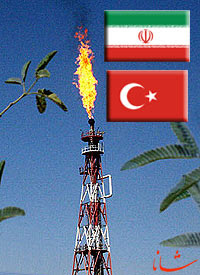Iran is countering U.S. opposition to an Ankara-Tehran deal on gas fields and pipelines, The New Anatolian quoted undersecretary for economic and commercial affairs at the Iranian Embassy in Ankara as reporting.
Ahmad Nurani added, “I don’t think that Turkey’s opinion will change because of the American attitude.” Turkey and Iran signed a memorandum of understanding on gas issues during a recent visit by Iranian Oil Minister Seyyed Kazem Vaziri-Hamaneh to Turkish Energy Minister Hilmi Guler in Ankara. If details are ironed out during a visit to Tehran next month, Turkey will get development rights to three phases of Iran’s South Pars gas field.
It also will add Iran as a feeder to the Nabucco gas pipeline, a major non-Russian natural gas project to supply Europe. Iran has the world’s second-largest natural gas reserves.
Iran will also be a transit country for Turkmenistan’s gas to Nabucco. The United States is discouraging investment in Iran while its nuclear program is being probed by international regulators. “It does not seem wise to put increasing trust in Iran as a source and transit country of natural gas” while its nuclear program is under international scrutiny, said Kathryn Schalow, spokeswoman for the U.S.
Ahmad Nurani added, “I don’t think that Turkey’s opinion will change because of the American attitude.” Turkey and Iran signed a memorandum of understanding on gas issues during a recent visit by Iranian Oil Minister Seyyed Kazem Vaziri-Hamaneh to Turkish Energy Minister Hilmi Guler in Ankara. If details are ironed out during a visit to Tehran next month, Turkey will get development rights to three phases of Iran’s South Pars gas field.
It also will add Iran as a feeder to the Nabucco gas pipeline, a major non-Russian natural gas project to supply Europe. Iran has the world’s second-largest natural gas reserves.
Iran will also be a transit country for Turkmenistan’s gas to Nabucco. The United States is discouraging investment in Iran while its nuclear program is being probed by international regulators. “It does not seem wise to put increasing trust in Iran as a source and transit country of natural gas” while its nuclear program is under international scrutiny, said Kathryn Schalow, spokeswoman for the U.S.

Embassy in Ankara, the Anatolia News Agency reported. Nurani called U.S. influence in the deal “negative and not constructive.” “You all know what the U.S.
did in Iraq,” Today’s Zaman reported him as saying. Turkish Prime Minister Recep Tayyip Erdogan played down U.S.
critiques. “We import oil and natural gas.
We want to decrease the amount we pay for imports,” he said. “Iran made us an attractive offer.
Should we not think of our country’s interests at this point? Is the United States going to ask why we did not seek their permission? I believe they will understand.
Iran’s Petropars eyes foreign oilfields
The managing director of the Petropars Company said here on Friday that the company is seeking a long-term concession or possession of the foreign countries’ oilfields.
Talking to reporters, Gholamreza Manuchehri added that Petropars could hold the shares of an oilfield for 30 years. Negotiations are underway in Venezuela and Africa, he said.
Via: Tehran Times
Blogalaxia : Venezuela
Tags: